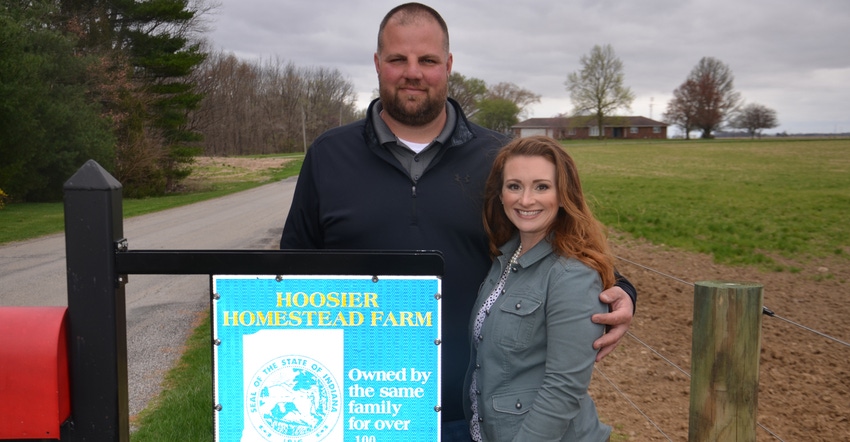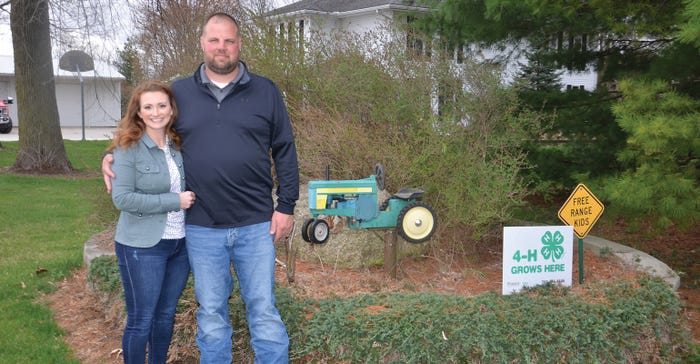
Cameron Mills learned early in his farming career that he didn’t have to be an expert at everything or do everything himself. Cameron and his wife, Cara, discovered that by asking lots of questions, seeking advice from professionals in various fields and being willing to innovate when necessary, they could develop a progressive, successful farming operation.
If you’re a no-tiller, especially if you value soil health and use cover crops, you probably have heard of the Mills operation. In fact, you may have heard Cameron speak. He’s progressed from learning about cover crops at an early National No-Tillage Conference to being a speaker at the annual event. In fact, he’s spoken about no-till and soil health to farmers as far away as Canada and Italy.
Related: Welcome new class of Master Farmers
Cameron, of Walton, Ind., graduated from Lewis Cass High School in 1996 and took advantage of an opportunity. His father, Tom, was ready to transition out of farming. Cameron assisted him, and his dad fully retired in 1997. At the time, they farmed about 600 acres. Cameron continued farming, using primarily conventional farming techniques, until 2000.
At that time, Cameron began shifting toward no-till. Labor savings and the ability to invest in much less equipment were attractive, he says.
“We tried it in 2000, and got along pretty well,” Cameron says. “I talked to a lot of other farmers who were trying similar things and did a lot of listening. I still do that today.”
Soil health matters
Today, Cameron typically no-tills corn and soybeans green into cover crops. He uses either cereal rye or annual ryegrass ahead of soybeans, and a mix of annual ryegrass, crimson clover and hairy vetch ahead of fields going to corn.
“The secret to getting a good burndown on herbicides is to do things right as much as you can,” Cameron insists. It’s not a place to cut corners, he adds.
Related: Cameron and Cara Mills earn respect
Cameron raises all non-GMO crops. Besides corn and soybeans, he typically includes a sizable acreage of triticale and grain sorghum in the rotation. The triticale is sold for seed, and the grain sorghum is shipped to a company selling birdseed. Having a crop like triticale in the rotation allows him to plant a 17-way cover crop mix on those acres after harvest in late summer.
“We also don’t use very much commercial potassium,” Cameron notes. “It’s all about keeping the salt load down and improving soil health.”
That doesn’t mean he doesn’t soil test. In fact, Cameron uses a large amount of technology in his operation. Instead of commercial fertilizer, he spreads poultry litter wherever he can to meet nutritional needs for phosphorus and potassium.
Cameron relies on people in the industry for advice on agronomic matters and works closely with his seed adviser. To him, a trusted seed adviser is much more than a seed corn salesman. The Millses also use financial advisers when necessary.

More recently, they’ve developed a grass-fed beef operation, keeping about 50 head of cattle at one time.
“In the old days, people tore out fences, and now we’re putting them back,” he quips. “We fence off some fields so we can graze cover crops when possible. We also have set up permanent pasture for rotational grazing.”
The couple also raise some chickens and sell eggs locally. “We’ve involved our kids in the livestock projects,” Cara says. “It’s a good way to teach responsibility.”
Cameron and Cara Mills at a glance
Age: 43 (Cameron)
Location: Walton, Cass County
Started farming: Cameron helped his dad phase out of farming in 1997. Then he began farming on his own.
Farming entity today: The operation is several times bigger than when Cameron assisted his dad in the late 1990s. He’s converted to no-till, using cover crops and emphasizing soil health.
Crops: Corn, soybeans, triticale and grain sorghum are all non-GMO. The Millses market their non-GMO crops for a premium when possible, but also raise them to improve soil health.
Livestock: They maintain about 50 head of feeders in a rotational grazing operation, marketing the beef locally as grass-fed. They also raise chickens to market eggs locally. Pasture-raised poultry and pasture-raised pork will be added this year.
Tillage methods: The Millses no-till into cover crops whenever possible. Following triticale, Cameron sows a 17-way cocktail cover crop mix so he can include species that benefit soil health.
Employees: One full-time employee, Blake Ulerick
Children: Thomas, 19; Jeffrey, 17; Bailey, 15; and Taylor, 13. Cara home-schools their children.
Leadership: Cameron is a supervisor on the Cass County Soil and Water Conservation District board and a former county committeeman for the Farm Service Agency. He is also a former board member of the Sangralea Valley Boys Home. The Mills farm was one of the 12 original research and demonstration farms for the Conservation Cropping Systems Initiative project. Cara is an active 4-H volunteer and heavily involved in the Fountain of Life Home School Support Group and the Sangralea Valley Restoration Association.
Nominator: Bonnie Sonafrank, one of their landowners and Cameron’s aunt
Notable: Cameron spoke about no-till and soil health to 250 Italian farmers using Skype, but it wasn’t because of COVID-19. He experienced a string of airplane delays and decided to cancel the trip. Instead, he spoke and answered questions via computer.
About the Author(s)
You May Also Like




